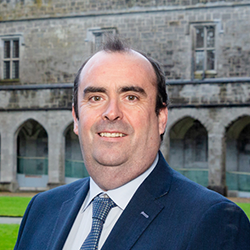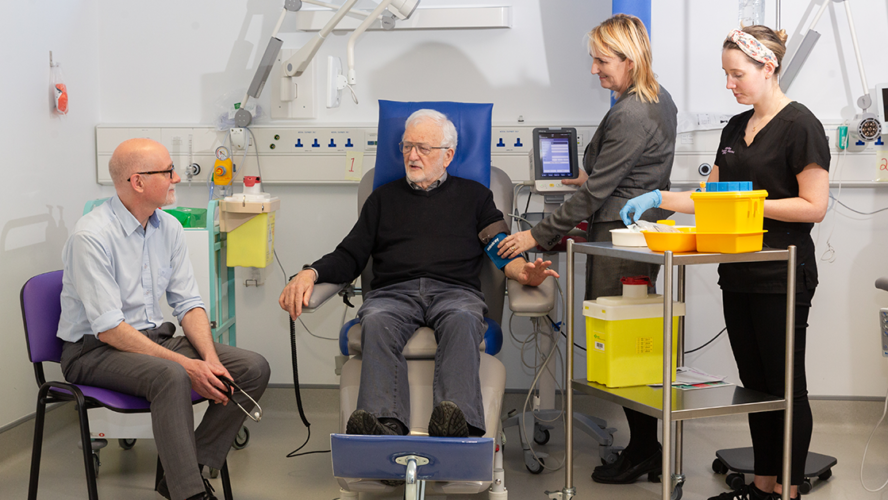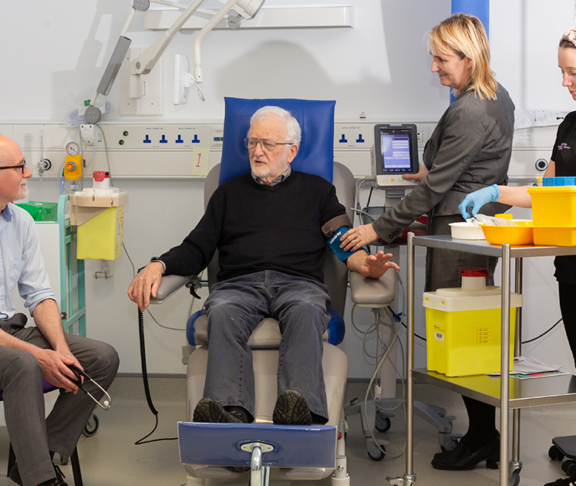
Professor Peter Doran
Director of the Clinical Trials Institute
Developing Ireland’s clinical trials research with new health infrastructure will benefit both local and global healthcare while enhancing the workforce and shaping future health policies.
Clinical trials contribute to global health by advancing medical knowledge and patient care while ensuring new treatments are safe and effective. Ireland, a strong hub for biopharmaceutical manufacturing, has the potential to be at the forefront of European clinical trial research.
A new Irish health infrastructure
The key to strengthening Ireland’s position in the world of clinical trials is to develop the capacity and expertise that supports health research. This is a valuable asset for Ireland because it enables the health sector to drive high-quality clinical research and impact the care and health outcomes of the Irish population. Playing a role in this development is the new Institute of Clinical Trials at the University of Galway, which will be officially inaugurated at the end of May this year.
“The idea of the institute is to provide an environment in which one can rapidly translate our excellent science into impacts on patients and the wider public,” says Professor Peter Doran, who will direct the new institute’s research. “We will have large programmes in areas of significant clinical need.”
A well-connected system
At a local level, the institute aims to position Galway as a centre for excellence for clinical research, which will have a positive impact on the region’s economic growth and social development.
It will be supported by five work programmes that focus on building partnerships for growth, delivering excellence in trials, promoting innovation, enhancing the workforce and shaping future Irish and global health policies.
This can boost the country’s ability to manage diseases and find solutions to some of the world’s most pressing health issues. “This is a really significant development for us here in Galway and for Ireland,” says Doran.
The Irish-leading cog in an international machine
that’s all about improving outcomes for
patients regardless of where they live.
“In terms of the national picture, our objective is to transform Ireland’s clinical research landscape by creating this institute..”
The institute will also play a role in the global clinical trial environment, with aims to position it as “being the Irish-leading cog in an international machine that’s all about improving outcomes for patients regardless of where they live,” Doran says.
“The institute will also be very well connected internationally, so we’ll partner with other centres globally in addition to the partnerships we currently have.”
Knowledge-based partnerships
Clinical trials are growing increasingly complex and present dynamic challenges for researchers as they work on study designs and testing new treatments.
“The type of issues we try to tackle nowadays are complicated. Healthcare issues are complex,” says Doran. “These challenges require us to put groups together of the best minds we can get to rise to the challenge of enhancing patient outcomes.”
As the clinical research landscape evolves and trials aim to find new, faster and more efficient ways to bring innovative and effective treatments to patients, fostering collaborative and diverse partnerships is an ever-important ingredient for successful progress in the world of healthcare.
“We’re very open and very active in this field of developing partnerships as a route to research success, such as with other academic groups around the world. We also will have a significant focus on developing partnerships with the medical devices industry, the pharmaceutical industry and indeed the wider bioscience industry. We see these as really important partners because once again, they help us to achieve our goal, which is to have the maximum impact we can on patients,” concludes Doran.



